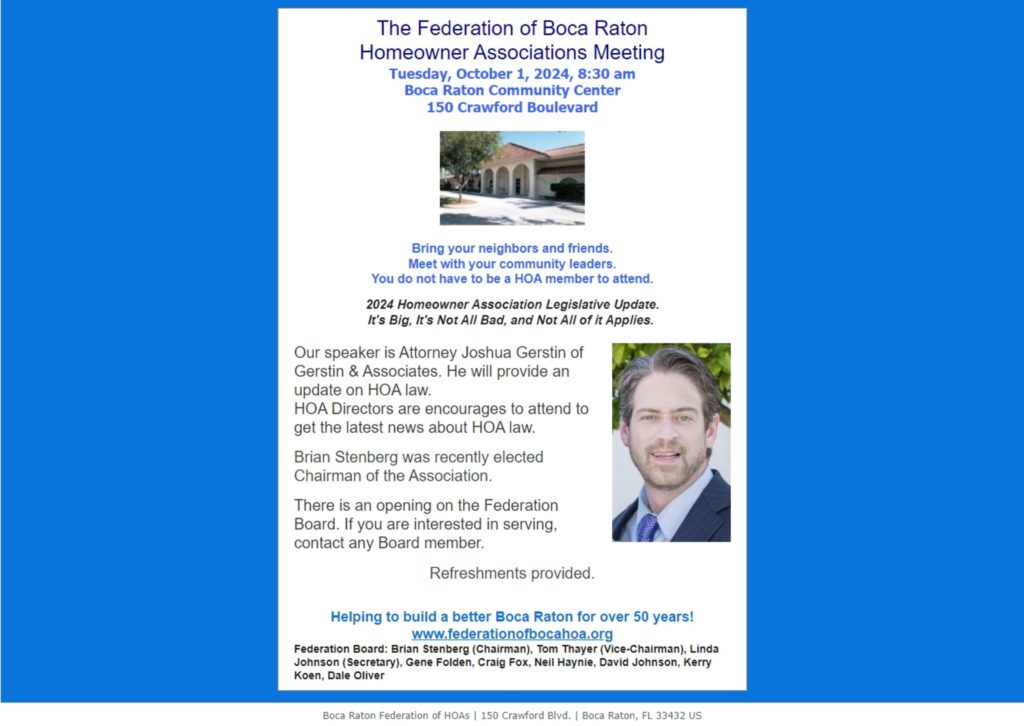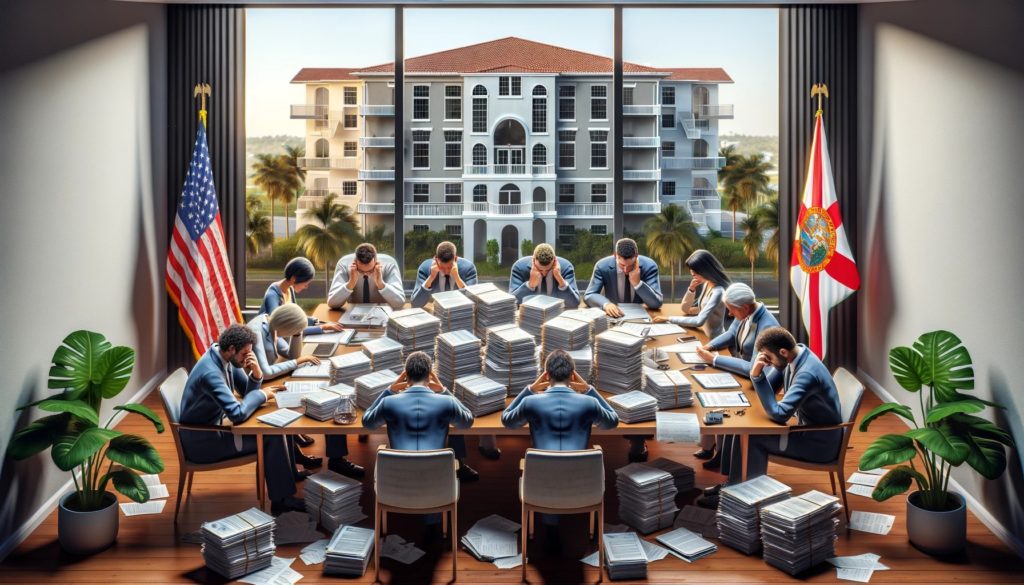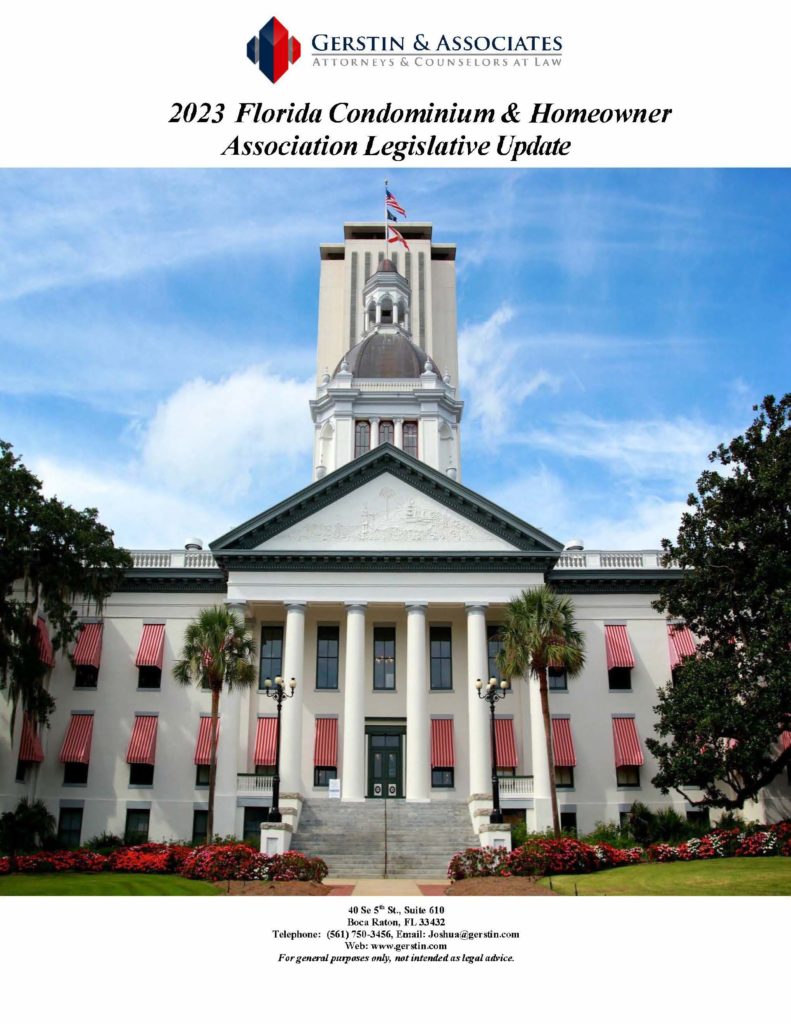The Do’s and Don’ts of Retrofitting your Community Association for Pickleball.

By: Joshua Gerstin, Esq.
Gerstin & Associates

By: Joshua Gerstin, Esq.
Gerstin & Associates

Joshua Gerstin, Esq. presenting at the Delray Alliance of Residential Associations on September 4, 2024

click here for .PDF of this article
“A butterfly flaps its wings in Africa, and a hurricane lands in Florida six months later.” The same can be said about community associations. A few bad actors in one part of the state are caught, and six months later, an entirely new regulatory scheme for community associations is passed.
Known as “Condo 3.0,” the recently passed legislation affecting condominium associations is extensive. Plan ahead to avoid issues, the legislation goes into effect on July 1, 2024.
Although not as extensive as the condominium association legislation, homeowner associations were not spared extra regulation. The legislation affecting homeowners associations goes into effect on July 1, 2024.
Click here for the full text of the bill
The bill requires community association managers (CAMs) and CAM firms to return all community association records in their possession within 20 business days of termination of a services agreement or a written request whichever occurs first, with license suspension and civil
penalties for noncompliance, except that the time frames applicable to timeshare plans apply to the records of a timeshare plan.
The bill provides conflict of interest disclosure requirements and a process for associations to follow when approving contracts with CAMs and CAM firms, or a relative, that may present a conflict of interest. The requirements are similar to the conflicts of interest provisions for condominium associations and their officers and directors, including:
Currently, single-family, two-family, and three-family dwellings are exempt from the milestone inspection requirements. The bill exempts four-family dwellings with three or fewer habitable stories above ground.
Regarding access to the official records of a condominium association, the bill:
The bill provides the following criminal penalties related to condominium associations, and the official records of the association:
The bill provides that officers and directors charged with a criminal violation under ch. 718, F.S., are deemed removed from office and a vacancy declared.
Regarding condominium association budgets, financial reporting, and reserves, the bill:
Condominium and cooperative associations must notify the division within 45 days after the SIRS is completed. By January 1, 2025, the division must create a database of associations that have completed the SIRS. After December 31, 2024, the division must include in its annual report a list of all associations that have completed the SIRS.
The bill requires:
The bill provides education requirements for the officers and directors of condominium associations to require:
Regarding voting in condominium and cooperative associations, the bill:
The bill revises the requirements for the installation of hurricane protection in a condominium building, including:
The bill revises the prohibitions against “strategic lawsuits against public participation” or “SLAPP suits,” which occur when association members are sued by individuals, business entities, or governmental entities for matters arising out of a unit owner’s appearance and presentation before a governmental entity on matters related to the condominium association.
The bill includes condominium associations in the SLAPP suit prohibition, and protects unit owners who report complaints to government agencies or law enforcement, or make public statements critical of the operation or management of an association by prohibiting associations from:
The bill provides that the attendance of an officer or director at a meeting of the board is sufficient to constitute a quorum for the meeting and for any vote taken in his or her absence when the director is required to leave the room during the discussion and the taking of a vote on a contract in which the director, or his relative, has an interest.
The bill expands the division’s post-turnover jurisdiction to include:
In addition, the bill:
The division must submit findings by January 1, 2025, to the Governor, the President of the Senate, and the Speaker of the House of Representatives, of its review and recommendations of the website or application requirements for official records.
The bill provides for the appointment of the Condominium Ombudsman by the DBPR secretary instead of the Governor, and deletes the requirement that the ombudsman must be an attorney.
The bill provides that the statute of limitations and statute of repose for certain actions available to a condominium association or a cooperative association, will not begin to run until the unit owners have elected a majority of the members of the board of administration.
The bill revises the form in which the prospective purchaser of a condominium unit acknowledges receipt of specified documents to include a copy of the most recent annual financial statement and annual budget of the condominium association.
Effective October 1, 2024, the bill also:
Condominiums Within a Portion of a Building or Within a Multiple Parcel Building The bill revises the definition for the term “condominium property” to mean “the lands, leaseholds, improvements, any personal property, and all easements and rights appurtenant
thereto, regardless of whether contiguous, which are subjected to condominium ownership.”
Effective October 1, 2024, the bill provides disclosure requirements for the creation of condominiums within a portion of a building or within a multiple parcel building. The association of a condominium created within a portion of a building or within a multiple parcel building has the right to inspect and copy the books and records upon which the costs for maintaining and operating the shared facilities are based and to receive an annual budget with respect to such costs.
The bill also requires the Florida Building Commission to submit a report by December 1, 2024, to the Governor, the President of the Senate, the Speaker of the House of Representatives, and the chairs of the legislative appropriations committees and appropriate substantive committees with jurisdiction over ch. 718, F.S., of its review of the standards to prevent water intrusion through the tracks of sliding glass doors.
Click here for the full text of the bill.
The bill relates to using surplus lines of insurance for non-homesteaded homes (second homes).
Effective July 1, 2024.
Click here for the full text of the bill.
This bill creates a Condominium Pilot Program within the very popular My Safe Florida Home Program(Opens in a new window) that continues to be available to single family homes. Single family homeowners may get the free inspection and apply for their grant now. After July 1, 2024, the site will be updated to include condominium associations.
For condo associations to participate they must meet the following criteria:
Approval by a majority vote of the board of directors or a majority vote of the total voting interests of the association to participate in a mitigation inspection.
A unanimous vote of all unit owners within the building that is the subject of the mitigation grant.
Click here for the full text of the bill.
The bill relates to the governance of homeowners’ associations and the practice of the community association managers who manage those communities.
Regarding community association managers (CAMs) and CAM firms, the bill requires CAMs and CAM firms to:
The bill requires homeowners’ associations to:
The bill provides the following criminal penalties related to homeowners’ associations:
for the commission of a crime, or to assist another person with such avoidance or escape; and
The bill also expands the current criminal prohibitions against fraudulent voting activity to provide it is a first degree misdemeanor for:
·
Any officer or director charged with a criminal violation under ch. 720, F.S., must be removed from office and a vacancy declared.
The bill requires associations, if subpoenaed, to provide a copy of the requested records within five business days of receiving the subpoena and to assist law enforcement in any investigation to the extent permissible by law.
The bill:
The bill allows association parcel owners to make a written request for a detailed accounting of any amounts owed to the association. If the association fails to provide the accounting within 15 business days of a written request, any outstanding fines of the requester are waived if the fine is more than 30 days past due and the association did not give prior written notice of the fines. It also prohibits parcel owners from requesting another detailed accounting within 90 days of such a request.
The bill revises the education requirements for the directors of homeowners’ associations to:
The bill requires associations or an architectural, construction improvement, or other similar committee to:
Associations must have a hearing before a committee to review a fine or suspension issued by the board, and the bill:
The bill prohibits homeowners’ associations from issuing a fine or suspension for:
The bill also provides that homeowners’ associations may not prohibit a homeowner or others from parking:
In addition, the governing documents may not prohibit a property owner from:
The bill allows members of a homeowners’ association to consent to electronic voting by using an electronic means of consent. Current law requires written consent to vote electronically.
The bill permits only simple interest, not compound interest, to accrue on assessments and installments on assessments that are not paid when due.

On April 23, 2024, the Federal Trade Commission (FTC) reached a final decision on the Noncompete Rule (16 CFR 910). This rule addresses concerns regarding certain types of noncompete agreements that were deemed “unfair methods of competition”. The rule will become effective 120 days after its publication in the Federal Register. The FTC Rule can be found here.
Under the Noncompete Rule, most noncompete agreements for employees earning less than $151,164 per year will be prohibited, as well as those that arise from the sale of a business. This provision aims to protect employees’ rights and prevent undue restrictions on their ability to seek employment opportunities.
It is important to note that the Noncompete Rule includes significant changes compared to the previously proposed version. One notable change pertains to the requirements for employers to inform individuals who may have existing noncompete agreements those agreements are no longer valid. Employers will be obliged to adhere to certain notification procedures, ensuring individuals are properly informed about their rights and obligations concerning these agreements.
Undoubtedly, the new Rule law will face pushback and lawsuits that will try to stop its implementation. Stay tuned for regular updates.
Stay one step ahead of new legislation, recent case law, and new developments that may impact your community association by subscribing to the Gerstin & Associates newsletter.

By: Joshua Gerstin, Esq.
On January 1, 2024, a new Federal law known as the “Corporate Transparency Act” (“Act”) went into effect. The Act requires community association directors (and others) to disclose significant private personal information to the United States government by January 1, 2025.
Although the ACT was designed to pierce “shell” corporations in search of sex trafficking, money laundering, and other crimes, its overly and unnecessarily broad drafting ensnares community associations as not-for-profit corporations.
The ACT requires all corporations to report beneficial ownership information to the U.S. Treasury Department’s Financial Crimes Enforcement Network (FinCEN). Individuals who willfully fail to report the following information are subject to civil and criminal penalties:
• Association name.
• Board members’ names, birthdates, home addresses, and identifying information from a driver’s license, government-issued identification, or valid passport.
• Names, birthdates, home addresses, and identifying information from a driver’s license, government-issued identification, or valid passport of individuals with substantial control. Whether or not this requirement includes property managers is unknown.
Additionally, the federal government has to be notified within thirty days if any of the information already submitted changes (e.g., new directors or property managers). Currently, efforts are underway to exempt community associations from the ACT. However, considering this law was passed over a presidential veto and the inability of Congress to pass legislation, hopes are dim that the law will be changed before compliance is required. For more information or to prepare, below is the link to the website for submission of information for the ACT.
Beneficial Ownership Information Reporting | FinCEN.gov
Stay one step ahead of new legislation, recent case law, and new developments that may impact your community association by subscribing to the Gerstin & Associates newsletter.

On May 5, 2023, Florida’s Legislature concluded its annual 60-day legislative session. Unlike previous legislative sessions, this year’s session garnered little media attention while the legislators were busy at work passing many laws impacting Florida’s community associations.
For the .pdf version of this article, click here.
Following is a list of the bills Governor Ron DeSantis recently signed into legislation:
Board meeting notices. All Board meeting notices must specifically list the meeting’s agenda.
Owner deposits. If a homeowners association collects a deposit from a member for any reason, including for a tenant or construction, and regardless if it is called a “security deposit,” the association must maintain all funds separately and not commingle them with association funds. Additionally, all funds deposited with the association must be returned within thirty days after receiving notice the reason for which the deposit was collected is complete. If requested by the owner, the association must provide an accounting of the funds deposited within seven (7) days of receiving the request.
Kickbacks. If an officer or director (or property manager) solicits or receives anything of value for him or his family from any person or entity providing goods or services to the Association may be immediately removed from the Board by the remaining Board of Directors. The violator is also subject to civil monetary fines. However, an officer, director, or manager may continue to accept food consumed at a business meeting with a value of less than twenty-five dollars ($25.00) per person or a service or good receipt in connection with the trade fair or education program.
Official Records. The law clarifies any parcel owner, or their authorized representative, may inspect Official Records.
Fines. The existing law was clarified to make it clear that fines may be levied for violations of the declaration, bylaws, or rules. Additionally, the notice to the member from the fining committee must include a description of the alleged violation, the specific action required to cure such violation, if applicable, and the date and location of the hearing. A parcel owner can attend a hearing by telephone or other electronic means. The letter from the finning committee after its hearing must include any applicable fines or suspensions the committee approved or rejected and how the parcel owner or any occupant, licensee, or invitee of the parcel owner may cure the violation, if applicable. All payments for fines are due within five days from the notice to the member.
Voting. Each of the following acts is considered a fraudulent voting activity and constitutes a misdemeanor of the first degree:
Flags. If displayed respectfully, a homeowner may display up to two (2) of the following flags:
Storage & Display of Items. An association may not restrict parcel owners or their tenants from installing, displaying, or storing any items on a parcel that are not visible from the parcel’s frontage or an adjacent parcel, including, but not limited to, artificial turf, boats, flags, and recreational vehicles.
On June 9, 2023, Governor DeSantis signed the “glitch” bill to purportedly fix some issues with the recent “Surfside” related inspection law. The full text of the law is available here, and a .pdf of this portion of the article is available here. Unless otherwise indicated, this legislation takes effect immediately. As with many legislative efforts, determining the effectiveness of the legislation and the discovery of unintended consequences takes time. At the very least, the changes to the Structural Integrity Reserve Study law (SB 154) listed below are a good start:
Reserve Funding:
Inspections:
When implemented by an association, the following safeguards exempt an association from liability if a third party commits a crime on their property:
Stay one step ahead of new legislation, recent case law, and new developments that may impact your community association by subscribing to the Gerstin & Associates newsletter.
Click Here to Subscribe to the Gerstin & Associates Newsletter

On June 9, 2023, Governor DeSantis signed the “glitch” bill to purportedly fix some issues with the recent “Surfside” related inspection law. The full text of the law is available here, and a .pdf of this article is available here. Unless otherwise indicated, this legislation takes effect immediately.
As with many legislative efforts, determining the effectiveness of the legislation and the discovery of unintended consequences takes time. At the very least, the changes to the Structural Integrity Reserve Study law (SB 154) listed below are a good start:
Reserve Funding:
Inspections:
Stay one step ahead of new legislation, recent case law, and new developments that may impact your community association by subscribing to the Gerstin & Associates newsletter.

In the wake of Surfside, some South Florida’s condominium associations cannot find lenders willing to lend for capital projects or to potential buyers. It’s doubtful South Florida’s condominium associations that restored, rehabilitated, and stabilized their operation can ever leave the list.
For more information:
Fannie Mae, Freddie Mac Keep Secret “Blacklist” of Properties (therealdeal.com)
"The best way to predict the future is to create it."
--- Peter Drucker